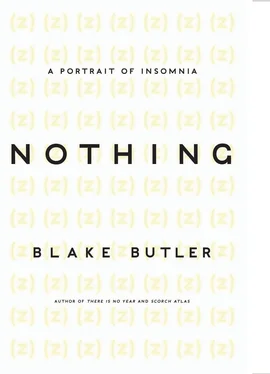One’s thoughts in thoughts becoming seeming not one’s own, but implicated, a stirring strung from out of incidental rooms. This depersonalization, in competition with the skin’s seeming thickening, the tongue fat in the mouth, the headaches and multiplying ramifications of the same amounts of light — the sun, some days, as if a gift becoming opened, something shearing in the wake — this seeming other becoming stuffed down in the body with all that new weight, all that pressure, the gift-wrap entering the body through the open hours, the mouth and ears, each inch that much further from the ballroom that is a daily routine made of common pacing, average hours, for which, inside of, most don’t even recognize the grandeur of the walls. The sum affectation here comes close if not culminates in something like what Brian Massumi calls the body without an image , “an accumulation of relative perspectives and the passages between them, an additive space of utter receptivity retaining and combining past movements, in intensity, extracted from their actual terms.”136 The body, entered upon by other, an awake veiling of consciousness by the unconsciousness, turning concrete, turning off, and yet in operation as an automaton, a puppet, a mime. “It is less a space in the empirical sense than a gap in space that is also a suspension of the normal unfolding of time.”137
The entry point, then, of most locations becomes not the average daily machine of limbs and body but of projection through the head — often seeing one’s future self forward in the making and yet still several feet behind, questioning the presence of the arm’s meat as it moves up to take the apple or the keys, and yet in this removal of ease for daily making, there comes another kind of surrounding air. A shortened, conscious drift between those hours most days entered via the unconscious, herein spread among the light. The common becoming less common-seeming, a series of false fronts; the uncommon becoming appeared in the paint around a window or a car, or in the excess clicking that a lock makes, the slower moving of the tongue. From inside the self, inside another. Above ground underground. As often hours, in too much waking, the very ground beneath the feet might seem alive — as if nothing inside you will shut up, there must be something causing all that noise. All those buried people come before me. All that sound once channeled through this home, and still somewhere here lodged inside a temporary silence, anticipating sound.
]
]
]
What I cannot remember from my own 129-hour bout is what it felt like at last to black out. I cannot remember how at the end, at some point after such days, all that blearing rolled so heavy it had no other angle left but to become none, and through some weird, false door come open in our household, I at last fell: the seemingly unending mode breached in an instant, without struggle, as if my many selves inside at last had gone collapsed, and rolled over in the space of their pulsed absence to allow another in, a low ghost at once and always rising in the new void without struggle, in the face of its home’s and our homes’ many also unsleeping machines. The feeling of long-wanted resignation lost among the blur space of the click of the space of day again in ending of this instance — one moment on, another out, with no warning in transition. While coming out of sleep can seem so jarring, a forced beginning to another opening of further day, going under wears the cloth of nowhere, upon which might be reflected skeins of images hid in one’s folds.
By the time you pass out, hid in the bubble, the air of most any room has stretched so thin, become so familiar in its unfamiliarity, and vice versa, that the space is not quite at all a space, but some bit of cells remaindered after popping. It can be difficult to recall where the house and self end and begin. The sleep comes often like warm wax pulled to snapping — turned to two selves, neither aware of the other where it is. This does not mean there is a mend to the exhaustion — the broken sleep comes often shallow, paired as if right next to the old air — at once so black in needing caving, but caught inside the brain’s grown-in difficulty of differentiating the waking blank from at last again being buried in the self. During my worst modes I can’t recall much ever remembering my dreams — the dreaming seems instead to cover every inch of time awake among that black mode — as if at last the space between waking and sleeping has turned inverted, impossible to split and gummed with blurring. The collapsed memory stores zapped, its compressed time warped forth as if no longer recording— nothing passing —something always ever not quite there.
All nights in my space-memory seem to somehow lock together in this way — the space between where one is there and seeing and naming and knowing slid at last behind some grainless glass to instead watch the self as on TV — the flood inside the self there resigned in silence or in sleepnoise, waiting to again be pulled back out into what the day will be again where it had been before, if slightly older, another iteration. Looking back over the course of all my time awake and waiting there inside me in the house, it’s hard to tell one evening from the next, each stuffed up with all the meat of breathing and the screenlight and the media of outdoors coming in through windows and staring into boxes and pacing and lurching at nothing or spread out on surfaces in various desperate poses mimicking some image of the dead, waiting to be filled. Even when I’m sleeping well there comes an hour alone up late before the body moves toward the bed where the small awarenesses of coming soon to reenter that nowhere that the body holds stirs to spread inside the head — some shapeless want.
]
]
]
Among all that shapelessness, there are certain moments that emerge from in the lull — that seem to give context to the rotation of the nights around it, despite their equal utter perimeterless architecture — time aging also among time. Maybe my earliest memory of any all seems to initiate the space of all waking as mirror hall: I am standing in the kitchen of my house, before it was built onto; my mom in the bathroom running me a bath; outside it was dark and in the house was dark too beyond a dim glow in the kitchen where I was, though the light inside the bathroom there held so much bright, a light as white as neon milk, and Mom was in there sitting by the tub shape in the light’s shell; the bathwater in the tub was running and she was stirring the body of it with her one hand, the other hand flat on her lap aimed toward and looking down through the short hall to where I was, and she was telling me to come in to where she was with her but I couldn’t hear her for some reason in the night, something surrounding in the air there, and in the space surrounding by the want to move and not moving the house around me seemed to grow, like the hallway seemed to keep getting longer, like I could never walk down the hall from where I was to where she was, though in the space of homes as a home is it was really then only like eight feet, and I could not move there, and I was crying, and in my mind the night goes on and on that way. Nights since then have seemed all to spread out from this instance, time before time could in me become counted like a wall — ending any day at the last instance of the day ended the day before this one, its friction with the night again tonight— one imagines —here soon to come.
Perhaps the other most heavy loomer in my age of night’s work is the manner by which my years-long dream of the rolling boulder just above my bed finally came to end, which actually in how it sits upon my memory doesn’t concern the dream itself at all — the dream one night simply disappeared, an abrupt blanking in its procession’s long unfurling surface, never to return. Instead of the dream’s end defining its ending — as at the time it ended I did not know it would be gone— and maybe it is not actually gone yet — maybe each night I dream it still and can no longer recall —what I remember most about the boulder’s mental termination, these years later, is how upon waking from what became its final instance, another form had taken shape — a man inside a white car parked right there in the street outside my house. I could see him clearly from my bedroom from my bed there, newly woken, the house around me otherwise as if on pause. The man sat inside the car with engine on and did not move, his head straight on, looking forward, shrouded of features. For some time I could not either seem to move myself — I remember how my head felt stuck against the glass where I’d moved up to press against it, my breath making a little fog around my sight — the form of the head and torso in the car showing no shudder. The light of night around us refused to change — no stir inside the house around me — my parents on their backs and breathing in their bed — all the still, inanimate machines. Hours, it seems, went by in this condition. Nothing. Through the frame of the glass the waiting house and me around my vision seemed to curl a bit around the sides, cleaving to the seeing of this moveless man there — where had he come from — what did he have inside him wanting — why. There is, in my remembrance of it, no sound or feeling. Time inside that night went on as if it had been this way all through all time into an image on my head imprinted.
Читать дальше












